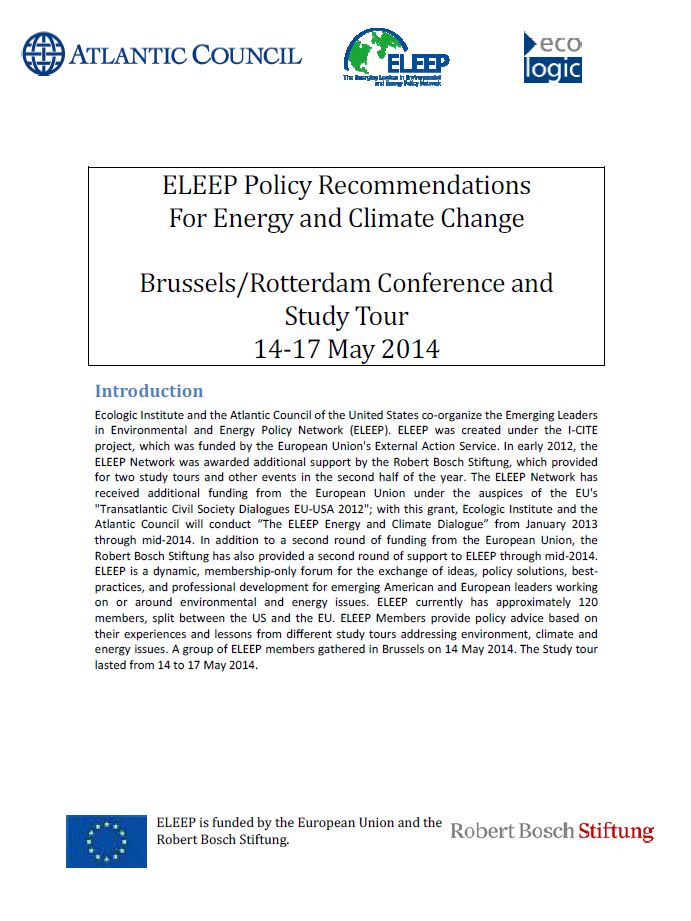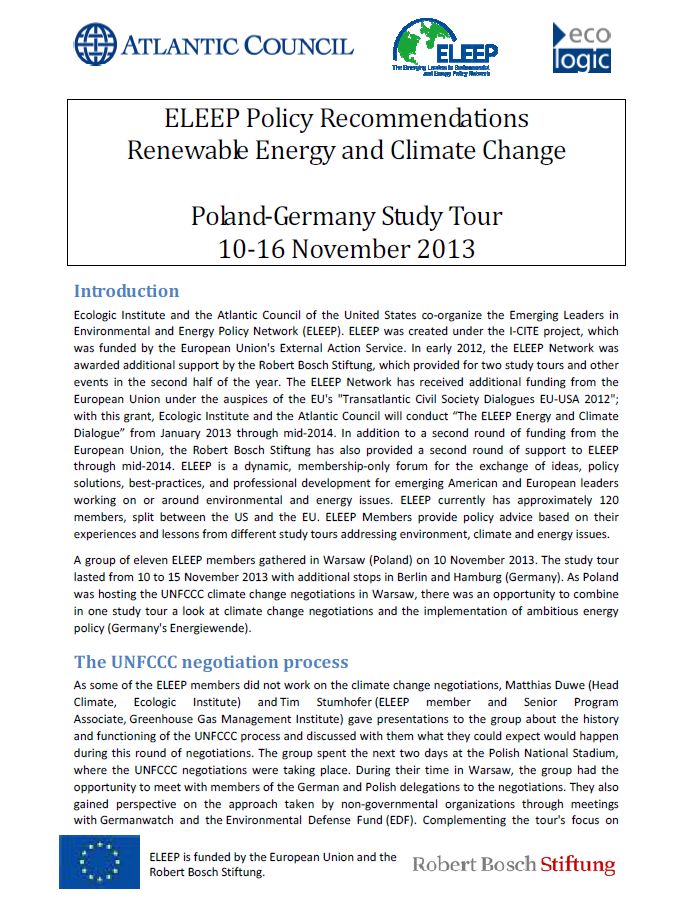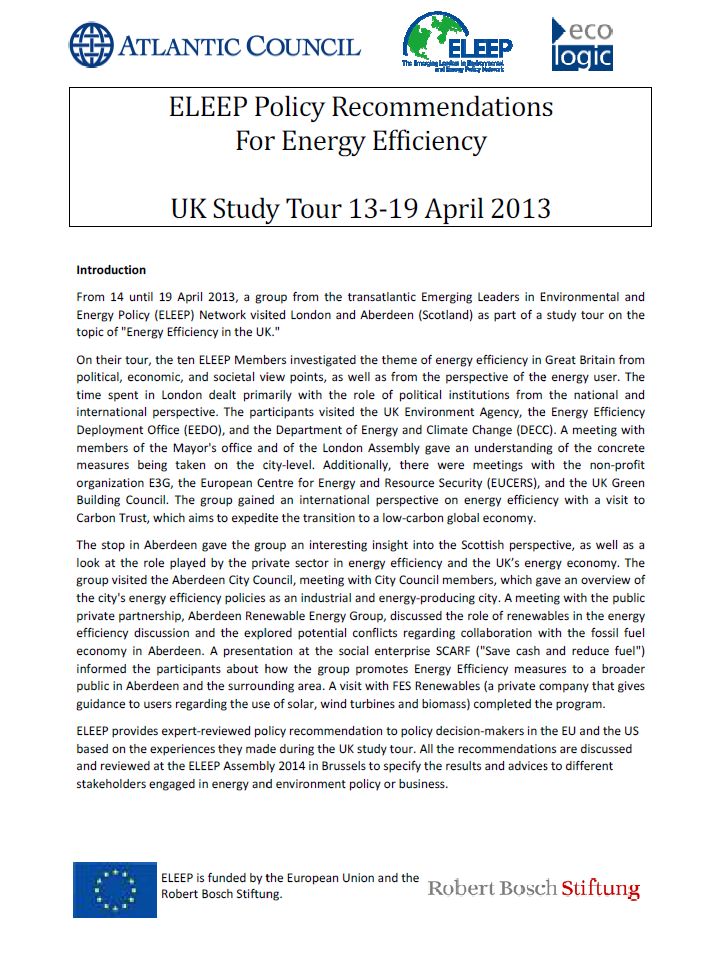
First I-CITE Study Tour: Renewables and Rural Energy Opportunities
- Event
- Date
-
-
- Location
- Germany, Austria
While renewable energy and its role for achieving an energy transformation, improving the environment, and supporting rural economies is a hotly discussed topic in both the US and Europe, approaches to increasing the share of renewables in the energy mix differ significantly on opposite sides of the Atlantic. As a result, exchanging Transatlantic experiences and lessons learned is of crucial importance.
I-CITE responds to this need for exchange by organizing a range of study tours that bring together decision makers and other relevant Transatlantic stakeholders to explore and discuss innovative solutions to unlocking the potential of renewable energy on the community level in the US and Europe.
The first I-CITE study tour, held from 21-26 August 2011, took 15 Americans (primarily from Colorado and South Dakota) and 5 Europeans (from Germany, Latvia, and Sweden) around Bavaria, Germany and Upper Austria to explore how policies, vision, and political leadership are spurring businesses and entrepreneurs to bring about a transition to an energy system dominated by renewable energy. "Germany and Austria have ambitious goals for the installation and utilization of renewable energy, exemplifying Europe's commitment to renewable energy," said Timo Kaphengst, Senior Fellow and forest and bioenergy expert at Ecologic Institute Berlin. The tour was designed to have conversations with entrepreneurs, farmers, foresters, politicians, researchers, and local politicians to see what different approaches are available to achieve these goals. "We gave special attention to Germany's Renewable Energy law, which as an important tool for encouraging the use of new energy technologies in Germany, played a decisive role," added Kaphengst. "The US participants were keen to learn about how the feed-in tariff and other policies have resulted in increasing numbers of renewable installations and led to economic development," said Stephanie Wunder, Senior Fellow and agricultural and bioenergy policy expert at Ecologic Institute Berlin. "We had a spirited discussion on the challenges and possibilities of translating the feed-in tariff and other policies to the US context. The diversity of participants enriched the discussions and led to a more integrated view of possibilities, benefits and challenges for renewable energy development."
Over the course of five days [pdf, 780 kB], the participants were able to visit a number of renewable energy installations. "The participants were impressed by the entrepreneurial and business activity being driven by the political support provided for renewables at the regional, state, and EU levels," said Dominic Marcellino, Fellow and renewable energy expert at Ecologic Institute Washington. "The entrepreneurial success stories we heard at the Straßkirchen Solar Park and from ÖkoFEN [a pellet boiler heating specialist in Upper Austria] particularly struck the group."
"We were able to show the participants integrated renewable systems at the village level in Ascha and at the farm level at Biolandhof Braun," said Andreas Graf, Transatlantic Intern at Ecologic Institute Berlin. "At each stop, the participants would chat with each other about how to implement what they were seeing back in the US."
The tour is the first of a series Ecologic Institute will be leading that focuses on building Transatlantic networks to exchange lessons and best practices on a range of environmental policies. "Our goal is to help regional and local leaders understand the array of policy options out there and to make decisions based on experience. The study tours enable us to get Europeans and Americans in the same room to talk through what does and doesn't work" said Marcellino.
During the tour, participants discussed methods for transmitting and transferring lessons, best practices, and effective policies into their respective regional situations. They were able to discuss these issues in depth with several political leaders: Mr. Hans-Josef Fell (Member of the German Bundestag), Ms. Christine Kamm (Member of the Bavarian State Assembly), and Mr. Rudi Anschober, the Upper Austrian Minister for the Environment. The Energiesparverband of Upper Austria assisted with the program in Austria and also hosted a dinner for the group on 24 August 2011, where they were joined by Dr. Gerhard Dell, head of the Verband, and Mr. Hannes Herndl, the President of the Upper Austrian Chamber of Agriculture.
The I-CITE project was jointly organized by the Ecologic Institute and the Atlantic Council of the United States with financial support for this tour from the European Union's External Action Service, the German Foreign Ministry, the World Future Council, and the Sopris Foundation.
I-CITE stands for "Incubating Communities of influence for Transformation of their economies and environment". It was a civil society dialogue project sponsored by the European Union with study tours on a number of subjects related to environmentally-sound economic transformation and the creation of the Emerging Leaders in Environmental and Energy Policy Network (ELEEP).
Further Links:
- Emerging Leaders in Environmental and Energy Policy Network (ELEEP)
- a study tour to Detroit and Pittsburgh looking at the transformation of industrial regions;
- a study tour to Germany and Denmark exploring the transformation of the energy economy;
- a summit in Brussels, which explored a wide range of issues and gave ELEEP members an opportunity to highlight their work for the rest of the group, and
- a study tour to Budapest, Hungary on the subject of the EU’s energy and environmental policy in Central Europe.
- a study tour to Colorado and California on hydraulic fracturing and renewable energy, to provide an American context to energy policy developments;
- a study tour to Stuttgart and Paris examining the evolution of sustainable transportation and mobility through business and policy initiatives.
- Tri-State Neighbor: International Series: S.D. delegation explores European renewable energy projects by Barry Amundson (7. November 2011)
- Aspen Journalism: Biomass in Germany and in Austria … and in Colorado? (28 September 2011)
- Madison Daily Leader: S.D. group returns from energy study tour (30 August 2011)
- Press Release of the South Dakota Farmers Union (SDFU): South Dakotans Return from Renewables Study Tour in Germany, Austria (29 August 2011)
- Article in the German Regional Newspaper "Landshuter Zeitung": Amerikaner informieren sich in Bioenergie-Region Straubing-Bogen (25 August 2011) [German]
- Press Release of the South Dakota Farmers Union (SDFU): SDFU President, Other South Dakota Leaders to Travel to Germany, Austria to Tour Renewable Energy Sites (17 August 2011)
- Dakota Midday
Air Date: 30 August 2011
Jeff Nelson is the general manager of East River Electric Power Cooperative and Chris Studer is the communications director of the South Dakota Farmers Union. They discuss their week long trip to Germany and Austria touring renewable energy sites and what can be implemented in South Dakota. - South Dakota Delegation Returns From European Renewable Fuels Tour Posted: 29 August 2011
A South Dakota delegation led by the State Farmers’ Union just returned from a week-long tour of Germany and Austria renewable energy companies. Farmers Union’s Chris Studor says the group was able to bring back some ideas for improving renewable energy production in South Dakota. He says Europe has a community based model that leads to energy independence and that should be a goal in the U.S. as well.
Studor says it’s important for the U.S. to be more aggressive in developing renewable energy for the future.
Studor hopes everyone will work together to achieve a more sustainable renewable fuels industry whether its ethanol, biodiesel, solar or biogas. -
Bringing German energy practices back home
featured video at KSFY
Posted: 4 September 2011
When Chris Studer went overseas, he said what stood out the most was Germany and Austria's promise to keep their energy strong. "They've made a commitment to become more sustainable energy-wise. They're becoming more energy efficient in the way they build and use their homes," Chris Studer said. He saw solar panels on almost every home. And he tells KSFY that's something Americans, and South Dakotans, need to start. "Americans need to change their mindsets in many ways to become more renewable in the way they think and to become more energy efficient when it comes to home and businesses," Studer said... - Inside KELOLAND: Renewable Energy
By Darcy Andersen
Published: 4 September 2011 - Ecologic Institute Project: I-CITE: Transforming Economies through Community
- Ecologic Institute Presentation: Renewable Energy Policy – The German Experience
- Dinner Dialogue: Possibility of and Opportunities from the Implementation of an Energy System Powered only by Renewable Energy - Hans-Josef Fell
- Dinner Dialogue: Emergence of German Renewable Energy laws, and Germany’s feed-in tariff (FiT) mechanism - Christine Kamm







